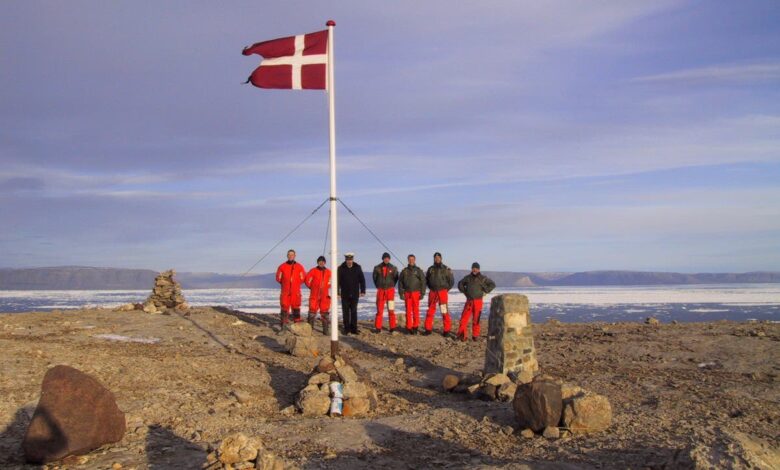That’s how to solve an international row: Canada and Denmark agree to split disputed Arctic island

Canada and Denmark have agreed to divide a tiny, barren and uninhabited Arctic island between them, ending a decades-long friendly friction dubbed the “whisky war”.
Under the joint agreement, a border will be drawn across Hans Island in the waterway between the northwestern coast of the semi-autonomous Danish territory of Greenland and Canada’s Ellesmere Island.
The new deal also means Canada will now share a land border with a country other than the US.
Hans Island is a 1.3-square-km rock in the Arctic sea passage with no mineral reserves. It is located nearly 1,100km south of the North Pole.
“It sends a clear signal that it is possible to resolve border disputes… in a pragmatic and peaceful way, where all parties become winners,” Danish foreign minister Jeppe Kofod said.
He added that it was “an important signal now that there is much war and unrest in the world”.
The dispute dates back to 1973 when Canada and Denmark tried to draw a border through the Nares Strait, halfway between Greenland and Canada. They were, however, unable to agree over which country should have sovereignty over Hans Island.
While the nations decided to work out the question of ownership later, the territorial dispute was nicknamed the “whisky war” over the years.
In 1984, Denmark’s minister of Greenland affairs Tom Høyem raised a Danish flag on the island, buried a bottle of Danish schnapps at the base of the flagpole and left a note saying: “Welcome to the Danish island.”
Canadians retaliated by planting their own flag and leaving a bottle of Canadian brandy.
Since then, both the countries have reportedly hoisted their flags and left bottles of alcohol in tit-for-tat moves.
The agreement will be implemented after the two countries’ internal procedures have been completed. In Denmark, the parliament must first give its consent to the agreement.
Aluki Kotierk, president of Nunavut Tunngavik, the legal representative of the Inuit in Canada, hailed the deal.
“The dispute between Canada and Denmark over Tartupaluk or Hans Island has never caused issues for Inuit. Regardless, it is great to see Canada and Denmark taking measures to resolve this boundary dispute,” Ms Kotierk said in a statement to Globe and Mail.
“As geographic neighbours with family ties, Inuit in Nunavut and Greenland recognise the significance of working together toward our common future. NTI expects this long-standing relationship between Inuit in Nunavut and Greenland to be a symbol of continued co-operation between Canada and Denmark,” she said.





